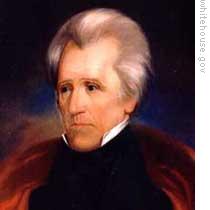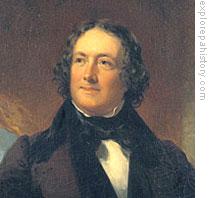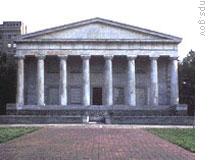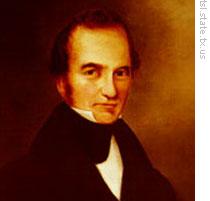VOA慢速英语 2008 1204b
搜索关注在线英语听力室公众号:tingroom,领取免费英语资料大礼包。
(单词翻译)
Welcome to the MAKING OF A NATION – American history in VOA Special English.The national election of eighteen thirty-two put Andrew Jackson in the White House for a second term as president. One of the major events of his second term was the fight against the Bank of the United States. Jackson believed that the bank had grown too powerful. He urged Congress not to renew the bank's charter to do business. He also stopped putting federal money into the Bank of the United States. Instead, he put the money into state banks.
 |
| Andrew Jackson |
The head of the Bank of the United States was Nicholas Biddle. Biddle fought with all his power to keep the bank open. He created a financial panic and blamed it on President Jackson. Biddle did this by demanding immediate1 repayment2 of loans. Businesses struggled without the bank's financial assistance. Workers lost their jobs. President Jackson was warned that a mob could march on Washington. But nothing happened. Most of the battle against the Bank of the United States was fought in Congress.
Now, in this week's program in our series, we continue the story with Bob Doughty3 and Sarah Long.
VOICE ONE:
Senator Henry Clay of Kentucky led the support for the bank. Clay was head of the opposition4 political party, the National Republicans. Clay argued his case on the floor of the Senate for three days. He strongly urged the Senate to re-new the bank's charter. He said:
"The country is in the middle of a revolution ... not yet a bloody5 revolution. But things are happening that point to a total change of the pure republican character of our government. Power is being centered in the hands of one man." He meant President Jackson.
Clay added: "If Congress does not act, the government will fail. And we will all die as slaves." Clay then asked the Senate to condemn6 Jackson for violating the constitution and the nation's laws. The Senate approved the resolution.
VOICE TWO:
Things went better for Jackson in the House of Representatives. James Polk defended Jackson's opposition to the bank. Polk said: "The bank set itself up as a great, irresponsible, competing power of the government. If the bank wins this fight, no man afterwards can expect to be elected to high office in this country without first surrendering to the bank. The question is," Polk said, "if we shall have the republic without the bank or the bank without the republic."
(MUSIC)
VOICE ONE:
As time passed, businessmen began to see that the Bank of the United States was being much tighter in its money policy than was necessary. They began to feel that it was Biddle -- not Jackson -- who was responsible for the serious economic situation in the country. Biddle took no responsibility for the financial crisis. He said:
"The relief must come from Congress, and Congress alone. The bank feels no need to right the wrongs caused by these miserable7 people. This president thinks he is to have his way with the bank. He is mistaken."
VOICE TWO:
 |
| Nicholas Biddle |
Biddle then made a serious mistake. He asked the governor of Pennsylvania to make a speech to the state legislature--a speech supporting the bank.
At the same time, Biddle refused to lend the state of Pennsylvania three hundred-thousand dollars. The governor was furious. Instead of making a speech supporting the bank, he made one that sharply criticized it. The upper house of the Pennsylvania legislature agreed with the governor. Although Nicholas Biddle threatened all sorts of action, the upper house passed a resolution that Congress should not give the bank a new charter.
VOICE ONE:
Two days later, the governor of New York proposed that the state sell four or five million dollars of stock for loans to help state banks. The New York legislature approved selling even more.
This action would strengthen the state banks and help to break the power of the Bank of the United States. Nicholas Biddle began to see that the battle was lost. He started making more loans to businesses. The economic panic he had started slowly ended.
VOICE TWO:
 |
| A Bank of the United States building in Philadelphia, Pennsylvania |
Jackson's victory over the Bank of the United States was clear. Biddle started to lose the support of many members of Congress. In the House of Representatives, James Polk proposed four resolutions on the bank. One said the bank should not get a new charter.
The second resolution said government money should not be deposited in the bank. The third said the government should continue to put its money in state banks. And the fourth proposed an investigation8 of the bank and the reasons for the economic panic in the country. All four of these anti-bank resolutions were approved.
VOICE ONE:
One of Biddle's assistants described the feelings of bank officials.
"This day," he said, "should be ripped from the history of our republic. The president of the United States has seized the public treasury9 in violation10 of the law of the land. And the representatives of the people have approved his action."
Jackson's words were shorter: "I have won a glorious triumph."
(MUSIC)
VOICE TWO:
The other major event of Andrew Jackson's second term as president was the situation in Texas. In an agreement with Spain in eighteen nineteen, the United States had given up its claim to Texas. In exchange, Spain gave the United States all of Florida.
After Mexico won its independence from Spain in eighteen twenty-one, the United States tried to buy Texas. Mexico did not want to sell. When Andrew Jackson became president he, too, tried to buy Texas. Mexico still refused to sell.
VOICE ONE:
 |
| Stephen Austin |
Texas was a rich land. But it was empty. Mexico decided11 to permit Americans to build colonies in Texas. Stephen Austin formed the first colony in eighteen twenty-two. Each farming family in his colony could have about eighty hectares of land.
Each family that wished to raise cattle could have about two thousand hectares. The settlers in Texas were able to buy the land for almost nothing. But they had to promise to join the Roman Catholic Church. They also had to promise to obey the laws of Mexico.
Most of the settlers came from the states of Tennessee, Mississippi and Louisiana. Many owned slaves and brought the slaves with them to Texas. During the eighteen twenties, Americans poured into Texas for the low-priced land.
VOICE TWO:
The leader of one American colony got into trouble with the Mexican government. He was ordered to leave, but refused. With the help of a few supporters, he seized the town of Nacogdoches. He declared Texas to be an independent republic. He called it Fredonia.
This man expected the other American colonists12 to join him against Mexico. He was wrong. Most of the colonists did not support him. In fact, some even joined the Mexican force that put down his rebellion. The man fled back across the border into the United States.
VOICE ONE:
The rebellion failed. But it made Mexican leaders see the danger of continuing to permit Americans to settle in Texas. The Mexican government sent an official to inspect conditions along the border with the United States. The official reported that as he traveled north through Texas, he saw less and less that was Mexican and more and more that was American.
He said there were very few Mexicans in some towns. And these Mexicans, he said, were extremely poor. He said the American settlers were not becoming true Mexicans. They were not speaking Spanish. They were not becoming Roman Catholics. And they were not accepting Mexican traditions. The official said the situation in Texas could throw the whole Mexican nation into revolution. He urged Mexico to send troops to occupy Texas.
That will be our story next week.
(MUSIC)
ANNOUNCER:
Our program was written by Frank Beardsley. The narrators were Bob Doughty and Sarah Long. Transcripts13, MP3s and podcasts of our programs are online, along with historical images, at voaspecialenglish.com. Join us again next week for THE MAKING OF A NATION - an American history series in VOA Special English.
___
This is program #62 of THE MAKING OF A NATION




